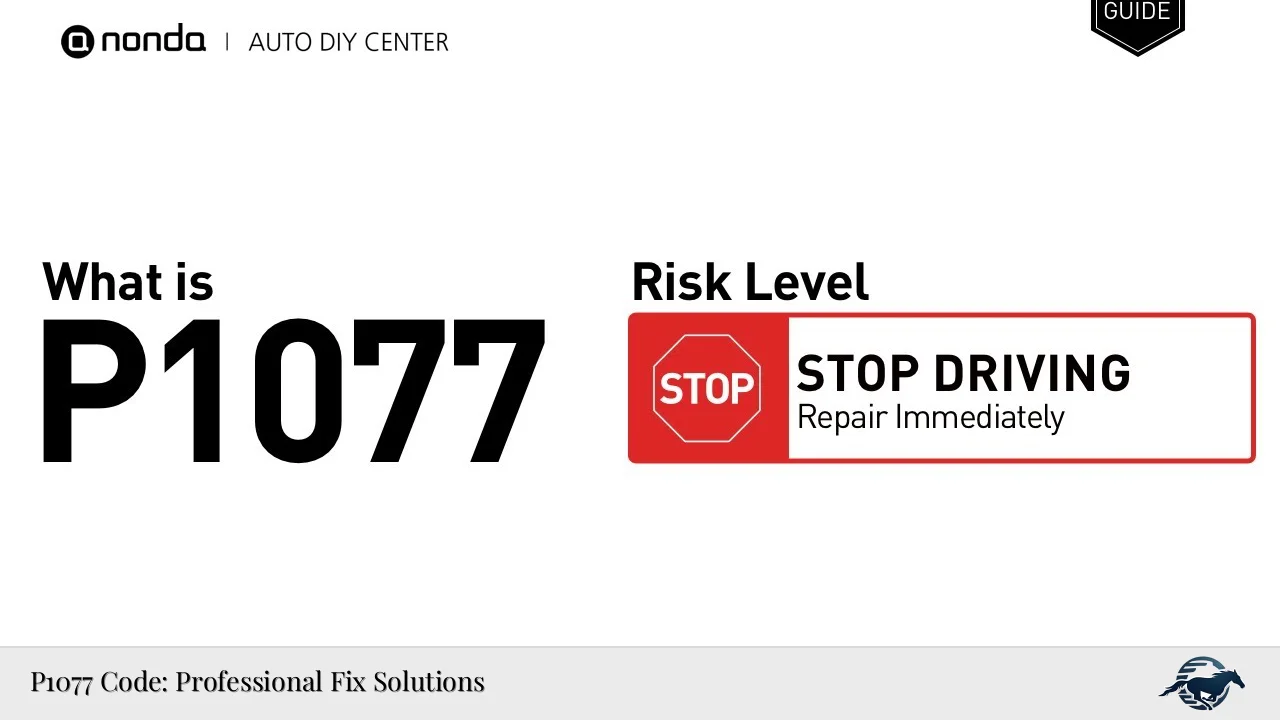The P1077 code is an OBD-II trouble code that points to issues related to the fuel system, particularly involving the fuel composition sensor's performance. When this code is triggered, it indicates that the engine control unit (ECU) detects an incorrect signal from the fuel composition sensor, which is crucial for optimizing fuel mixture and engine performance. Understanding the P1077 code and addressing its underlying issues is vital for maintaining your vehicle's performance and longevity.
Key Takeaways
| Aspect | Details |
|---|---|
| Code Nature | OBD-II Diagnostic Trouble Code |
| System Affected | Fuel System |
| Common Vehicles | Various makes and models including GM, Ford, and Honda |
| Potential Impact | Decreased fuel efficiency, engine misfires, potential damage to engine components |
| Recommended Action | Diagnostic check and sensor evaluation |
Code Description and Meaning
The P1077 code specifically refers to an issue with the fuel composition sensor, which monitors the ratio of different fuel types (like ethanol and gasoline) in the tank. This information helps the engine control module (ECM) determine the best fuel-air mixture for optimal combustion. If the sensor fails or sends incorrect data, it can lead to a range of problems in engine performance.
- Implications of P1077:
- Inaccurate fuel mixture can cause poor combustion.
- Can trigger additional codes related to fuel system performance.
- Often leads to reduced fuel economy and increased emissions.
Common Causes
Several factors can trigger a P1077 code, including:
-
Faulty Fuel Composition Sensor:
- A common reason for code activation; the sensor may be worn or damaged.
-
Wiring Issues:
- Damaged or corroded wires and connectors related to the fuel sensor can lead to inaccurate readings.
-
Poor Fuel Quality:
- The use of contaminated or incorrect fuel can affect sensor performance.
-
ECU Malfunction:
- A failure in the engine control unit may cause it to misinterpret sensor data.
-
Software Glitches:
- Outdated software or bugs in the ECU programming can also play a role.
Symptoms
When the P1077 code is present, drivers may notice various symptoms, such as:
-
Check Engine Light illuminating on the dashboard.
-
Decreased Engine Performance:
- Symptoms may include reduced acceleration or power.
-
Poor Fuel Economy:
- Drivers may find they are refueling more frequently.
-
Rough Idle or Engine Stall:
- The engine may run roughly or even stall unexpectedly.
-
Increased Emissions:
- Vehicles may fail emissions testing due to improper fuel mixture.
Diagnosis and Troubleshooting Steps
Diagnosing the P1077 code requires a systematic approach, encompassing several diagnostic steps.
-
Use an OBD-II Scanner:
- Start by scanning for diagnostic trouble codes. Look for P1077 and related codes.
-
Inspect the Fuel Composition Sensor:
- Check the sensor for any visible signs of damage and verify its connection to the harness.
-
Examine Wiring and Connectors:
- Search for frayed, damaged, or corroded wires connecting to the sensor.
-
Test Fuel Quality:
- Ensure the fuel being used meets the vehicle's specifications.
-
Evaluate ECU Functionality:
- Check for any faults or glitches within the engine control unit using specialized software.
-
Update Software:
- If the engine management software is outdated, consider an update.
-
Perform a Continuity Test:
- Ensure that there is proper electrical continuity between the sensor and the ECU.
Repair and Replacement Procedures
Addressing a P1077 code often involves different repair and replacement strategies depending on the underlying cause:
-
Replacing the Fuel Composition Sensor:
- If the sensor is found faulty, replace it with a new one to restore proper function.
-
Repairing Wiring Issues:
- Cut, splice, or replace damaged wires and connectors associated with the fuel sensor.
-
Cleaning Fuel System:
- If poor fuel quality is an issue, consider cleaning the fuel system or replacing the fuel filter.
-
Reprogramming the ECU:
- For software-related issues, reprogram the ECU or update it if needed.
-
Clearing Codes and Testing:
- After repairs, clear the diagnostic codes and conduct road tests to ensure successful resolution.
Cost to Fix
Repairing the P1077 code can incur various costs based on the malfunction's severity and the make/model of the vehicle:
-
Diagnostic Fee:
- Ranges from $50 to $150, depending on the technician’s experience and equipment.
-
Fuel Composition Sensor Replacement:
- Parts cost between $50 and $200, excluding labor.
-
Labor Costs:
- Mechanic labor rates can range from $75 to $150 per hour, potentially adding $100 to $300 to the repair total.
-
Wiring Repair:
- Cost varies widely depending on the extent of damage, typically between $50 and $200.
In total, the overall repair cost can range from $150 to $600, depending on what repairs are needed.
Importance of Prompt Repair
Not addressing a P1077 code in a timely manner can lead to several consequences:
-
Increased Repair Costs:
- Ignoring the issue can lead to more significant engine problems requiring costly repairs.
-
Diminished Fuel Efficiency:
- A persistent problem can reduce fuel economy significantly, leading to higher expenses on fuel.
-
Potential Engine Damage:
- Continued operation under poor conditions could lead to severe engine components wear or failure.
-
Environmental Impact:
- Poor fuel burning results in increased emissions, which harm the environment.
Resources for Further Assistance
For vehicle owners experiencing issues related to the P1077 code, various resources can provide assistance:
-
Vehicle Repair Manuals:
- Comprehensive manuals specific to your vehicle’s make and model can guide troubleshooting.
-
Online Forums:
- Websites like Reddit, or automotive forums, often contain discussions where fellow automotive enthusiasts offer advice.
-
Professional Mechanics:
- For complicated issues or lacking experience, it's typically best to consult a certified mechanic.
-
OBD-II Diagnostic Tools:
- Investing in diagnostic tools may help monitor vehicle health proactively.
-
Local Auto Parts Stores:
- Stores often have knowledgeable staff who can provide recommendations for parts and repairs.
Conclusion
The P1077 code indicates a significant issue within your vehicle's fuel system involving the fuel composition sensor. Taking immediate action to diagnose and repair this code is crucial to maintaining optimal vehicle performance and avoiding further damage. Understanding common causes, recognizing symptoms, following proper diagnostic procedures, and considering the financial implications of repairs are all critical components of managing this specific issue. With the right resources and professional support, resolving the P1077 code can restore both your vehicle's functionality and your peace of mind.It seems like your message got cut off. How can I assist you further? If you could provide more context or specify what you would like to continue discussing, I'd be happy to help!

